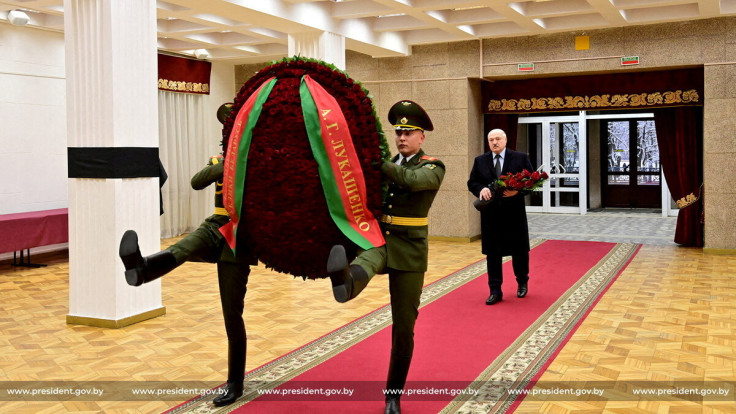Factbox-Flurry Of Military Activity In Belarus Stirs Concern In Ukraine

Constant Belarusian and Russian military activity in Belarus has stirred concerns that a new attack on neighbouring Ukraine could be possible in the coming months.
Russia used Belarus as a launchpad for its Feb. 24 invasion of Ukraine and continues to use Belarusian airspace for drone and missile strikes, Kyiv says. Minsk's troops have not taken part in the war, but have held military exercises near the shared border.
Now, Belarus says it plans to move military equipment and forces on Wednesday and Thursday in what it describes as a counter-terrorism exercise.
While some analysts think the moves may aim to distract Ukraine's attention from frontlines in the east and south and doubt Belarus would send troops across the border, drills held in September were openly condemned in Kyiv as hostile.
Here is a summary of military activity in Belarus.
JOINT MILITARY FORCE
Belarusian President Alexander Lukashenko ordered his army on Oct. 4 to check up on all people liable for military service by the end of the year. Some 70% of them had been checked by Dec. 1, the Belarusian defence ministry said.
He announced the deployment of a joint regional grouping of Belarusian and Russian forces in Belarus on Oct. 10. Moscow said 9,000 of its troops, 170 tanks and 200 armoured vehicles were set to join. Reuters has not been able to establish what the Russian troop presence in Belarus currently is. Ukraine has said thousands of Russian soldiers are in Belarus. At least 15 Russian TOR surface-to-air missile systems were delivered to Belarus by early December, the opposition said.
CLOSE KREMLIN ALLY
The former Soviet republic of 9.3 million people is a close ally of Russia and relies heavily on financial aid from Moscow whose support was vital for Lukashenko to survive anti-government protests that flared in 2020. Lukashenko, in office since 1994 and a pariah in the West, grips all the levers of power. Most prominent opponents are jailed or in exile.
He has spoken throughout the war of what he casts as the threat to Belarus and ally Moscow from the NATO military alliance, the West at large and groups of Belarusian volunteers who are fighting for Ukraine against Russia. Russia and Belarus are formally part of a "union state" that ostensibly aims to deepen cooperation.
Kyiv says it can't rule out an attack from Belarus, but that there are not enough forces there for an offensive now and that Lukashenko would like his troops to stay out of the war despite pressure from Moscow. Ukraine has aired a series of videos addressed to Belarusian soldiers, telling them to surrender immediately if they are ordered to invade. It says their good treatment is guaranteed if they do that.
FEARS IN MINSK
The Belarusian Interior Ministry began staging what it called anti-sabotage drills in the southeastern Gomel region that borders Ukraine and Russia on Oct. 11. The first Russian servicemen arrived in Belarus four days later to join the regional grouping. The Belarus Defence Ministry announced the start of a large-scale "rotation of army units" on its border with Ukraine on Oct. 17.
The head of the KGB domestic intelligence agency told tractor plant workers in Minsk on Oct. 17 that Belarusian volunteer fighters in Ukraine were planning to invade Belarus. Days later, the head of the Security Council in Minsk said the West was preparing to use regular troops against Belarus under the guise of nationalist formations.
A FIELD HOSPITAL AND VISITING GENERALS
Belarus conducted a new army exercise from Oct. 24 to Nov. 1 in the border town of Brest, which also involved drills for civil defence forces. Russia's army deployed a field hospital with a capacity of up 300 people a day on Nov. 24 in the Gomel border region as part of an exercise, Moscow said.
A group of Russian generals arrived in Belarus on Dec. 1 to conduct an inspection of Russian military units, according to opposition Telegram channel Gajun.
Russian Defence Minister Sergei Shoigu travelled to Belarus on Saturday and held talks with Lukashenko and the Belarusian defence minister. They discussed bilateral military cooperation and amended an agreement on the "joint provision of regional security". The details have not been disclosed.
(Editing by Timothy Heritage and Frank Jack Daniel)
© Copyright Thomson Reuters 2024. All rights reserved.





















